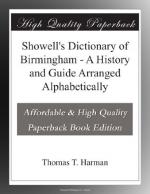Taylor, John.—Died in 1775, aged 64, leaving a fortune of over L200,000, acquired in the manufacture of metal buttons, japanned ware, snuff boxes, &c. It is stated that he sent out L800 worth of buttons weekly, and that one of his workmen earned 70s. per week by painting snuff boxes at 1/4d. each. Mr. Taylor must have had a monopoly in the latter, for this one hand at the rate named must have decorated some 170,000 boxes per annum.
Tomlins.—Samuel Boulton Tomlins, the son of a local iron merchant (who was one of the founders of the Birmingham Exchange) and Mary Harvey Boulton (a near relative to Matthew) was born September 28, 1797, at Park House, in Park Street, then a vine-covered residence surrounded by gardens. His mother was so great a favourite with Baskerville that the celebrated printer gave her one of two specially-printed Bibles, retaining the other for himself. After serving an apprenticeship to a bookseller, Mr. Tomlins was taken into Lloyd’s Bank as a clerk, but was soon promoted to be manager of the branch then at Stockport, but which was taken over afterwards by a Manchester Banking Company, with whom Mr. Tomlins stayed until 1873, dying September 8, 1879.
Ulwin.—Though nearly last in our list, Ulwin, or Alwyne, the son of Wigod, and the grandson of Woolgeat, the Danish Earl of Warwick, must rank first among our noteworthy men, if only from the fact that his name is absolutely the first found in historical records as having anything to do with Birmingham. This was in King Edward the Confessor’s time, when Alwyne was Sheriff (vice-comes) and through his son Turchill, who came to be Earl of Warwick,




